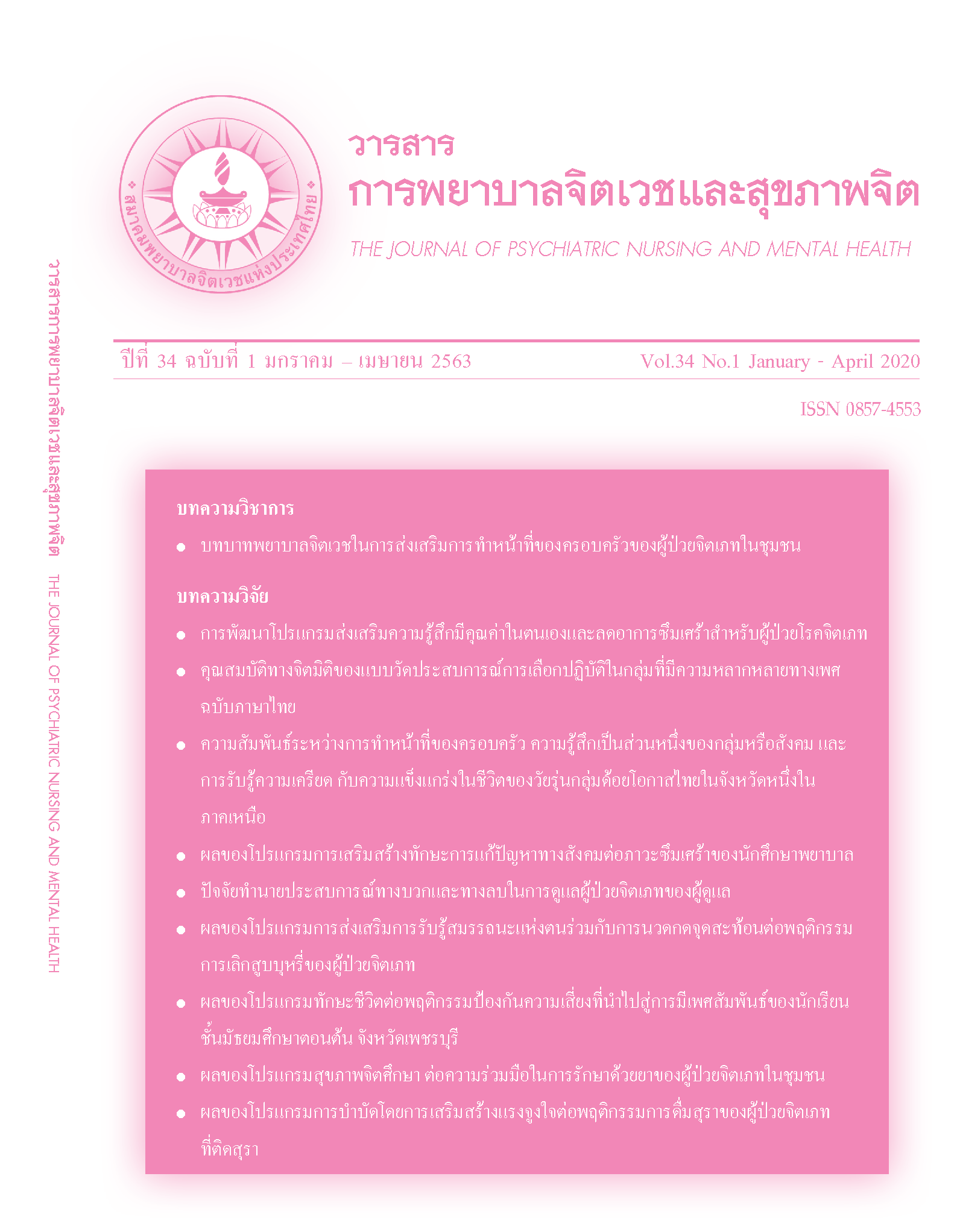ปัจจัยทำนายประสบการณ์ทางบวกและทางลบในการดูแลผู้ป่วยจิตเภทของผู้ดูแล
Main Article Content
บทคัดย่อ
วัตถุประสงค์: เพื่อศึกษาปัจจัยทำนาย ประสบการณ์ทางบวกและทางลบในการดูแล ผู้ป่วยจิตเภทของญาติผู้ดูแล ปัจจัยคัดสรรที่ศึกษา ได้แก่ การรับรู้ความรุนแรงของอาการทางจิต และ การรับรู้แหล่งสนับสนุนทางสังคม
วิธีการศึกษา: การศึกษาครั้งนี้เป็นการ วิจัยเชิงทำนาย กลุ่มตัวอย่างเป็นญาติผู้ดูแล ผู้ป่วยจิตเภทที่พาผู้ป่วยมารับบริการที่แผนก ผู้ป่วยนอกโรงพยาบาลสังกัดมหาวิทยาลัยแห่ง หนึ่ง กรุงเทพมหานคร จำนวน 70 คน เก็บข้อมูล ระหว่างวันที่ 1 พฤษภาคม – 11 สิงหาคม พ.ศ. 2560 เครื่องมือที่ใช้ในการวิจัยประกอบด้วย แบบสอบถาม ข้อมูลส่วนบุคคล แบบสอบถามการรับรู้ความ รุนแรงของอาการทางจิต แบบสอบถามการรับ รู้แหล่งสนับสนุนทางสังคม และแบบสอบถาม ประสบการณ์การดูแล วิเคราะห์ข้อมูลส่วนบุคคล โดยหาค่าเฉลี่ย ส่วนเบี่ยงเบนมาตรฐาน และข้อมูล ตัวแปรทำนาย ได้แก่ การรับรู้ความรุนแรงของ อาการทางจิต และการรับรู้แหล่งสนับสนุนทาง สังคม วิเคราะห์ข้อมูลโดยใช้สถิติบรรยาย และสถิติ การวิเคราะห์การถดถอยพหุคูณ
ผลการศึกษา:
- การรับรู้ความรุนแรงของอาการทางจิต และการรับรู้แหล่งสนับสนุนทางสังคม สามารถ ร่วมกันอธิบายความแปรปรวนของประสบการณ์ ทางลบในการดูแลผู้ป่วยจิตเภทของญาติผู้ดูแลได้ ร้อยละ 37.6 อย่างมีนัยสำคัญทางสถิติ (p < .05) โดยการรับรู้อาการทางจิตเป็นปัจจัยที่มีอิ ทธิพลต่อ ประสบการณ์ทางลบในการดูแลผู้ป่วยจิตเภทของ ญาติผู้ดูแลอย่างมีนัยสำคัญทางสถิติ (β = .612, p < .001)
- การรับรู้ความรุนแรงของอาการทางจิต และการรับรู้แหล่งสนับสนุนทางสังคม สามารถ ร่วมกันทำนายประสบการณ์ทางบวกในการดูแล ผู้ป่วยจิตเภทของญาติผู้ดูแลได้ร้อยละ 9.8 อย่าง มีนัยสำคัญทางสถิติ (p < .05) โดยการรับรู้แหล่ง สนับสนุนทางสังคมเป็นปัจจัยที่มีอิทธิพลต่อ ประสบการณ์ทางบวกในการดูแลผู้ป่วยจิตเภท ของญาติผู้ดูแลอย่างมีนัยสำคัญทางสถิติ (β = .303, p < .05)
สรุป: ผลการวิจัยเสนอแนะว่าพยาบาล จิตเวชควรเพิ่มความเข้าใจกับญาติผู้ดูแลเกี่ยว กับอาการทางจิตของผู้ป่วย วิธีการในการเข้าถึง และการใช้ประโยชน์จากแหล่งสนับสนุนทาง สังคมเพื่อช่วยให้ญาติผู้ดูแลมีการเผชิญปัญหาที่ เหมาะสม อันอาจนำไปสู่การลดประสบการณ์ ทางลบและเพิ่มประสบการณ์ทางบวกในการดูแล ผู้ป่วยจิตเภทของญาติผู้ดูแลได้
Article Details
บทความที่ได้รับการตีพิมพ์แล้ว เป็นลิขสิทธิ์ของสมาคมพยาบาลจิตเวชแห่งประเทศไทย
เอกสารอ้างอิง
Addington, J. & Burnett, P., (2004). Working with families in the early stages of psychosis. PsychologicalIntervention in Early Psycho¬sis: A Treatment Handbook (eda Gleeson, J.F.M. & McGorry, P.D.), PP 99-116. John Wiley and Sons, Chicheste.
Addington, J., Coldham, E. L., Jones, B., Ko, T., & Addington, D. (2003). The first episode of psychosis: The experience of relatives. Acta Psychiatric Scandinavia, 108, 285- 289.
Compton, M. T., Kaslow, N. J, & Walker, E. F. (2004). Observations on parent/family factors that may influence the duration of untreated psychosis among African American first-episode schizophrenia spectum patients. Schizophrenia research, 68, 373-385.
Czuchta, D. M., & McCay, E. (2001). Help seek¬ing for parents of individuals experiencing a first episode of schizophrenia. Archives of Psychiatric Nursing, 4(8), 159-170.
Ferriter, M., & Huband, N. (2003). Experiences of parents with a son or daughter suffering from schizophrenia. Journal of Psychiatric and Mental Health Nursing, 10, 552-560.
Folkman, S., & Lazarus, R. S. (1984). An analysis of coping in a middle-aged community sample. Journal of Personality and Social Psychology, 21, 219-239.
Grover, S., Chakrabarti, S., Aggarwal, M., Avasthi, A., Kulhara, P., Sharma, S., & Khehra, N. (2011). Comparative Study of the experience of caregiving in bipo¬lar affective disorder and schizophrenia. International Journal of Social Psychiatry, 58(6), 614-622.
Hair, J. F., Anderson, R. E., Tatham, R. L., & Black, W. C. (2010). Multivariate data analysis. (7th ed.). NJ: Prentice-Hall.
Harvey, K., Burns, T., Fahy, T., Manley, C., & Tattan, T. (2001). Relatives of patients with severe psychotic illness: factors that influence appraisal of caregiving and psychological distress. Social Psychiatry and Psychiatric Epidemiology, 36, 456-461.
Kulhara, P., Kate, N., Grover, S., & Nehra, R. (2012). Positive aspects of caregiving in schizophrenia: A review. World Journal of Psychiatry, 2(3), 43–48. http://doi. org/10.5498/wjp.v2.i3.43
Lau, D., & Pang, A. (2007). Caregiving experi¬ence for Chinese caregivers of persons suffering from severe mental disorders. Hong Kong Journal of Psychiatry, 17, 75–80.
Lazarus, R. S., & Folkman, S. (1984). Psychologi¬cal Stress and Coping Process. New York: Springer.
Lohacheewa, S., Sitthimongkol, Y., Sirapo-ngam, Y., & Viwatwongkasem, C. (2016). Psychological distress of family members caring for a relative with first episode Schizophrenia. Pacific Rim International Journal of Nursing Research, 20 (3), 183- 195. Retrieved from https://www.tci- thaijo. org/index.php/PRIJNR/article/view/42718.
McCann, T. V., Lubman, D. I., & Clark, E. (2009). First-time primary caregivers’ experience of caring for young adults with first-episode psychosis. Schizophrenia Bulletin. 37(2), 381-388.
Maj, M., Lopez-Ibor, J. J., Sartorius, N., Sato, M., & Okasha, A. (2005). Early Detection and Management of Mental Disorders. New Jersey: John Wiley & Sons.
Mo, F., Chung, W., Wong, S., Chun, D., Wong,K, & Chan, S. (2008). Experience of caregiving in caregivers of patients with first episode psychosis. Hong Kong Journal of Psychiatry, 18, 101-6.
Pipatananod, P. (2002). Caregiver Burden Predictive Model: An Empirical Test Among Caregivers for the Schizophren¬ic. Unpublished Doctoral dissertation, Mahidol University, Thailand.
Provencher, H. L., Perreault, M., St-Onge, M., & Rousseau, M. (2003). Predictors of psychological distress in family caregiv¬ers of persons with psychiatric disabilities. Journal of Psychiatric and Mental Health Nursing, 10(5), 592-607.
Reed, S. (2008). First- episode psychosis: A litera¬ture review. International Journal of Mental Health Nursing, 17, 85-91.
Rungreangkulkij, S., Chafetz, L., Chesla, C., & Gilliss, C. (2002). Psychological morbidity of Thai families of a person with schizo¬phrenia. International Journal of Nursing Studies, 39, 35-50.
Saunders, J. C. (1997). Families living with severe mental illness: a literature review. Issues in Mental Health Nursing, 24, 175-198.
Schaefer, C., Coyne, J. C., & Lazarus, R. S. (1981). The health-related functions of social support. Journal Of Behavioral Medicine, 4(4), 381-406.
Shives, L. R. (2006). Basic Concepts of Psychiatric Mental Health Nursing. (6th ed.). Lippincott Williams Wilkins.
Szmukler, G. I., Burgess, P., Herrman, H., & Benson, A. (1996). Caring for relatives with serious mental illness: The development of the experience of caregiving inventory. Social Psychiatry Psychiatric Epidemiol¬ogy, 31, 137-148.
Tennakoon, L., Fannon, D., Doku, V., O'Ceallaigh, S., Soni William., Santamaria, M., Kuipers, E., & Sharma,T. (2000). Experience of caregiving: relatives of people experiencing a first episode of psychosis. British Journal of Psychiatry, 177, 529-533.
Thorndike, R.M., (1978). Correlational proce¬dures for research. Gardner Press, Inc., New York.
World Health Organization (WHO). (2015). World health statistics 2015. Switzerland: World Health Organization.
Yamachita, M. (1999). Newman's theory of health applied in family caregiving in Canada. Nursing Science Quarterly, 12(1), 73-79.


